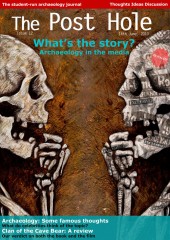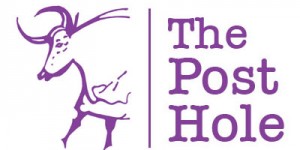Christina Cartaciano - How did you become involved with Archaeology?
Samir S. Patel - I trained as a science and environmental journalist and had never written about archaeology before I joined the staff here. I learned of the position through a colleague with whom I had worked at another science magazine, and within weeks I was on board. My initial thought about joining the staff was that I might feel stifled by the magazine's specific subject matter- after all, a little academic restlessness is what made me choose science journalism over a more traditional career path in the sciences. But that's been anything but the case, there is no end to the variety of the stories we get to tell and I feel privileged to get to tell them.
CC - What made you interested in writing about archaeology for the general public?
SSP - I suppose the answer to this lies in why I became a science journalist in general. As a writer, I am first and foremost a storyteller. Science in general and archaeology specifically provide some of the most compelling, surprising, appealing, and challenging stories out there. Also, archaeology- again, like science as a whole- is a field fraught with public misunderstandings, everything from clingy, outlandish theories to outmoded ways of thinking to old wives' tales that somehow become accepted knowledge. Archaeologists often have a difficult time explaining these muddy areas to the general public, which allows these misunderstandings to gel. We're like the translators who take good research and make it accessible to everyone, giving the general public the chance to truly understand what archaeology does for all of us.
CC - In your opinion, is it important to share archaeological knowledge among the public?
SSP - Archaeology tells us who we were, who we are, and where we're going. People may not realize it, but there's something to modern life that is inherently "archaeological." We collect and amass our own material culture all the time, so it can be the means by which we connect with the world around us and cultures that came before. So archaeology is one of the most accessible and popular fields of inquiry, and the public is hungry to understand it better. It relates us to our ancestors. It makes remote cultures real. It gives us something to share and celebrates the ways in which we're different. Public interest in this feeling of connection drives most archaeological research, but without someone to bring these stories to everyone, it could wither on the vine.
CC - Do you see or have you experienced any downsides to keeping the public informed about archaeological discoveries?
SSP - There are of course times when understanding of a particular culture or time period is incomplete, which can lead to blind alleys, inaccurate theories, and wild speculation. And when we write about those moments, the mistakes we all share--mistakes that are essential to the advancement of any field of science- can become part of the public record. But, in truth, that's not really even a downside, but another chance to tell a story with more detail and rigor.
CC - And finally, what is the first thing that pops into your mind when someone mentions the word 'archaeology'?
SSP - You mean besides the name of the place where I work? I think about what an excavation of my apartment might say about me.




